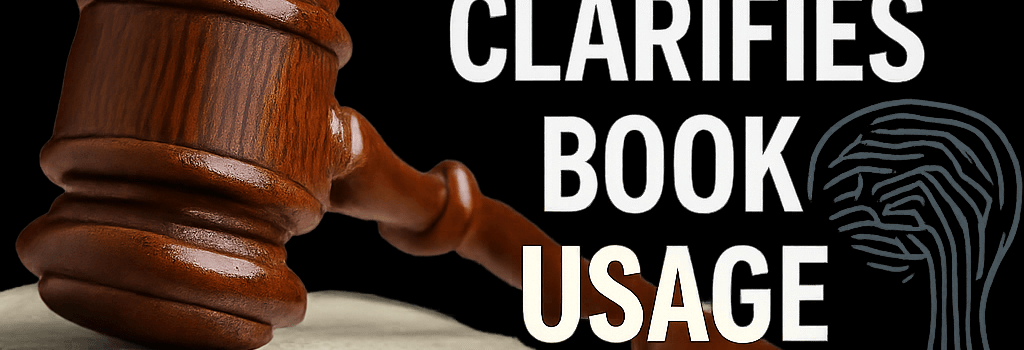Fair Use Ruling Clarifies Book Usage for AI Training

Overview of the Ruling
On June 23, 2025, US District Judge William Alsup issued a groundbreaking decision in Authors Guild v. Anthropic, concluding that AI developers may lawfully train large language models (LLMs) on copyrighted books they’ve legally acquired. This first-of-its-kind federal ruling acknowledges the transformative nature of training AI systems, likening the process to “schoolchildren learning to write.”
Key Findings
- Transformative Use: Judge Alsup held that ingesting text into an LLM’s pre-training pipeline alters the original work sufficiently to constitute a new creative expression.
- No Market Displacement: The plaintiffs did not demonstrate that Anthropic’s Claude outputs replicated or supplanted their books.
- Future Claims Remain Open: Authors can still sue if they find literal reproductions or infringing “knockoffs” in AI-generated text.
“Like any reader aspiring to be a writer, Anthropic’s LLMs trained upon works not to race ahead and replicate or supplant them—but to turn a hard corner and create something different.”
—Judge William Alsup
Case Background
The lawsuit began when a consortium of authors alleged Anthropic had unlawfully used copies of their books to train Claude, the company’s flagship AI model. Unlike other pending cases against Meta and OpenAI that hinge on alleged output-based infringement, this suit focused squarely on the training phase and whether that constituted fair use.
Anthropic’s Library of 7 Million Books
Plaintiffs pointed to evidence that Anthropic initially downloaded over 7 million pirated titles to populate a permanent “source library.” Though the company later replaced many with legally purchased copies, the judge found the initial piracy non-transformative and “inherently, irredeemably infringing.”
Why Piracy Undermines Fair Use
- Unauthorized downloading is itself a violation, regardless of downstream use.
- Retaining works in a static repository offers no new expression.
- Purchasing books only after theft does not absolve prior infringement.
Technical Deep Dive: Model Training Pipelines
Modern LLMs like Claude and OpenAI’s GPT series ingest text through multi-stage pipelines:
- Data Ingestion: Books are digitized into token sequences (commonly using Byte-Pair Encoding) yielding ~2,000 tokens per average 80 K-word novel.
- Preprocessing: Text is cleaned of metadata, embedded into high-dimensional vectors (up to 1,536 dimensions), and stored in distributed storage (e.g., AWS S3 or Azure Blob Storage).
- Pre-Training: The model’s transformer layers (e.g., 48 layers, 1,024 hidden units, 16 attention heads) iteratively predict masked tokens over weeks on GPU or TPU clusters.
- Fine-Tuning: A supervised step on curated summaries or domain-specific excerpts tunes the model for improved downstream generation.
Industry Implications and Best Practices
This ruling sets a precedent for AI labs worldwide, but also underscores the need for robust data governance:
- Licensing Agreements: Even if fair use covers training, explicit licenses ensure access to higher-quality metadata and legal certainty.
- Auditable Pipelines: Maintaining logs of data provenance and usage can demonstrate compliance if challenged in court.
- Content Filtering: Implementing privacy-preserving differential privacy or redaction layers can mitigate risks of inadvertently reproducing copyrighted text.
Expert Perspectives and Future Outlook
Alexandra Reid, IP attorney at TechLaw Partners, observes: “This decision bolsters R&D in generative AI, but developers must still vigilantly monitor output to avoid analysis of literal reproductions—the next frontier in litigation.”
Meanwhile, legislative bodies globally, including the EU’s AI Act and pending US federal bills, are revisiting copyright exceptions for training AI. Observers anticipate a Supreme Court review within two years, which will clarify these high-stakes questions once and for all.
Conclusion
Judge Alsup’s ruling marks a pivotal moment in AI jurisprudence, affirming that transformative AI training on legally obtained texts is fair use. However, the injunction against piracy and the door left open for output-based claims mean AI developers must continue prioritizing legal licenses, transparent data practices, and vigilant monitoring of generated content.